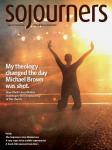POPE FRANCIS arrives in the U.S. this September to great acclaim. The popular pontiff will speak truth to power in Congress and at the United Nations and preach the necessity of stewarding creation, promoting an economy for life, and defending human dignity.
He also will canonize Junípero Serra, the Spanish Franciscan missionary who founded the first nine of 21 Spanish missions in California in the 18th century—many say on the backs of Indigenous people. While some call Serra a “shepherd and protector,” others argue he symbolizes the colonial conquest of North America through genocide.
Serra was a human being—sometimes noble, sometimes not. However, his conquest operated under a body of Christian law and policy called the Doctrine of Discovery, a series of papal documents (“bulls”) that granted legal right of ownership to whichever European Christian nation arrived first in the new territory. Since 1823 it has also been enshrined in U.S. law. As recently as 2005, Supreme Court Justice Ruth Bader Ginsburg cited it as the basis for denying a land claim by the Oneida people, one of the five founding nations of the Iroquois Confederacy.
The Doctrine of Discovery is based on a principle of Roman law called terra nullius (“nobody’s land”) and grew out of the church’s conviction that “discovered” lands were devoid of human beings if the original people who lived there (defined as “heathens, pagans, and infidels”) were not ruled by a Christian ruler. “The Doctrine mandated Christian European countries to attack, enslave, and kill the Indigenous Peoples they encountered and to acquire all of their assets,” wrote the World Council of Churches in a 2012 statement.
In the 15th century, the church’s theological justification was based on an interpretation of God’s command to conquer and kill the Canaanites. Christian European rulers were thus empowered to claim land and subdue people. The Great Commission in Matthew 28:16-20 empowered them to go unto all lands, and Romans 13 established the principle of “divine mandate,” with an interpretation that to oppose the state was to oppose God. In this way, the church constructed a theological and political framework for conquest that shaped law and morality in the “discovered world.”
Was Junípero Serra a kind man, protective and forgiving of the Indigenous people he attempted to convert? Was he cruel, employing segregation between believing and non-believing Indigenous people and corporal punishment for those who resisted working in the mission enterprises that produced cattle and grain for the Spanish colonists in California, as well as for Spain?
To many of the descendants of those he colonized, it doesn’t really matter. What matters is the reality we live with now.
Every year on the Yakama Indian Reservation where I live, Indigenous people and the descendants of settlers hold separate commemorations of our shared history. The Yakama Nation celebrates “Treaty Days,” to remember the 1855 cessation of hostilities between the First Peoples and the U.S. military. Settler descendants hold “Military Days” at Fort Simcoe State Park on the Yakama Indian Reservation to re-enact the military’s subjugation of Indigenous people.
Regardless of the intentions of those celebrating Military Days, they glorify a site that symbolizes violence and violation for Indigenous people—not unlike those who venerate Serra without examining the ongoing damage of the colonizing laws that promoted and defended his mission. To justify and glamorize the suppression of Indigenous people is to reinforce 500 years of injustice and sin. What Serra symbolizes matters—because it is part of a system of ongoing oppression.
The World Council of Churches and other Christian denominations have publically renounced the Doctrine of Discovery. It is incumbent on Pope Francis to discuss the doctrine and then rescind the papal bulls themselves, stating clearly that the doctrine’s framework can no longer be justified. Such an act could impact U.S. Indian law as well as global Indigenous policies. And it would give a profound Christian witness for the next 500 years.

Got something to say about what you're reading? We value your feedback!

